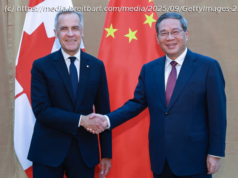 In a small shop hidden in the shadows of the gleaming, golden arches of the two-storey McDonald’s next door, Liu Wenzheng has been developing photographs since 1995. Business in his north Beijing neighbourhood is slow but steady. Every now and then, a Western couple will come in to have a photograph taken of their newly adopted Chinese child. The child is nearly always “imperfect” in some way, whether it’s something as minor as a cleft palate, or a more challenging disability.
In a small shop hidden in the shadows of the gleaming, golden arches of the two-storey McDonald’s next door, Liu Wenzheng has been developing photographs since 1995. Business in his north Beijing neighbourhood is slow but steady. Every now and then, a Western couple will come in to have a photograph taken of their newly adopted Chinese child. The child is nearly always “imperfect” in some way, whether it’s something as minor as a cleft palate, or a more challenging disability.
“Westerners have higher morals. They will adopt disabled children,” Liu tells me over a glass of baijiu , the distilled Chinese rice spirit, at a nearby restaurant. His disappointment in his own people is personal: Liu has been disabled for all of his adult life, since a run-in with Red Guards during the Cultural Revolution left him so badly beaten that his left leg had to be amputated. He was 22 and had been arrested for reading banned American literature.
He spent six months in hospital. After being discharged with a rudimentary wooden limb, he returned to his old job on a Beijing factory floor. “I was tough and people were scared of me,” Liu says, his brusque manner and burly frame illustrating his point. “Not every disabled person would have been allowed back to work with a full salary, to stand there and not do much.” Throughout our conversation, he emphasises the rarity of his situation compared to that of other disabled people. He has worked all his life, is happily married and has an adult son. Most disabled people in China are not so lucky.
A few miles north of Liu’s shop, on the outskirts of an eerily quiet retail park, Alenah’s Home is a warm hub of activity. This private centre for disabled orphans has been looking after children since 2004. The children come from orphanages all around China, which don’t have the funds or the facilities to provide disabled care. Many children, such as Furui, a one-year-old who was abandoned after a premature delivery, arrive with muscular atrophy – a result of months of neglect.
Alenah’s Home is one of the few private centres of its kind in China that look after disabled orphans. They don’t receive any government funding. Chris Hu, a full-time volunteer, tells me that children who are abandoned in China are nearly always female, disabled or both. This is in part a result of China’s one-child policy, which made China’s disabled population fall to 6 per cent of the country as a whole (the global average is 15 per cent) and also produced a gender imbalance of 120 boys for every 100 girls.
China’s one-child policy was officially abolished in January 2016. But Hu agrees with experts who predict that this won’t necessarily redress demographic imbalances. Cultural prejudices against disabled people are hard to shake. Confucian ideology emphasises the idea of the body as a point along an ancestral continuum. Thus, any defect is attributed to a spiritual flaw in the family, even for disabilities, such as Liu’s, which are caused by injury. It is easy to dismiss this kind of abstraction as stereotyping, but when Yuan Xiaolu, a retired journalist who has been blind in one eye since birth, repeatedly tells me, “I don’t blame my mother,” it suggests a genuine anxiety about the perception of her family’s morals.
In wealthy cities, and especially in popular tourist areas, public facilities are becoming more accessible to disabled people. The Chinese government claimed to have invested 500 million yuan in the construction and renovation of 25,000 public toilets in 2015, most of them wheelchair-friendly. This follows changes in the law to encourage greater inclusivity: employers are required to reserve 1.5 per cent of jobs for people with disabilities, or pay a fee to the Disabled Persons’ Employment Security Fund, which is managed by the China Disabled Persons’ Federation (CDPF), a government body.
However, meaningful social change lags behind. Disabled children are more likely to be found – and often abandoned – in poorer rural areas, where women can’t afford abortions and facilities don’t exist to support disabled people. Liu describes the government’s measures as “barely a cup of water when you need the sea”, saying that most companies would rather pay the fine than employ a disabled person.
Even then, John Giszczak, a former China programmes manager for Save the Children, has said that the fees paid to the CDPF often end up being spent on overpriced “pseudoscientific ‘therapeutic’ equipment”.
The CDPF was founded in 1988 by Deng Pufang, the son of the then Chinese leader, Deng Xiaoping. Like Liu, Deng Pufang was paralysed – left paraplegic after an assault by Red Guards during the Cultural Revolution. Having such a high-profile disabled person in Chinese public life contributed to a more open attitude towards physical disabilities, but this didn’t necessarily spread to all aspects of life.
Similarly, when the Hubei-based farmer Yu Xiuhua, who has cerebral palsy, published her poem “Crossing Half of China to Sleep with You”, which went viral on Chinese social media, she illustrated that her situation was an exception to the opportunities for disabled people, rather than the norm. Like most disabled people in China, Yu was unable to finish school and has spoken about how she has felt “undermined. . [and] hated” by her body. Still, she insists, “My disability really has nothing to do with my poetry.”
“It’s not the government that’s the problem. It’s the people,” Liu says. China is often characterised as a country where the official Communist Party line is the only one that matters. But most Chinese people I speak to see their culture as running far deeper than political diktats. Policies may change behaviour or improve facilities for disabled people, but social rehabilitation seems a long way off.
Still, I suggest to Liu, he seems to have done quite well for himself. His family and his photography business aren’t the future he foresaw when he first became disabled. “Not really,” he says glumly. “Digital ruined everything.”
Arron Banks, UKIP-funder, Brexit cheerleader and Gibraltar-based insurance salesman, took time out from Trump’s inauguration to tweet me about my role in tomorrow’s Women’s March “ Conservative values are in the ascendancy worldwide. Thankfully your values are finished. . good ”.
Just what about the idea of women and men marching for human rights causes such ill will? The sense it is somehow cheeky to say we will champion equality whoever is in office in America – or around the world. After all, if progressives like me have lost the battle of ideas, what difference does it make whether we are marching, holding meetings or just moaning on the internet?
The only anti-democratic perspective is to argue that when someone has lost the argument they have to stop making one. When political parties lose elections they reflect, they listen, they learn – but if they stand for something, they don’t disband. The same is true, now, for the broader context. We should not dismiss the necessity to learn, to listen, to reflect on the rise of Trump – or indeed reflect on the rise of the right in the UK – but reject the idea that we have to take a vow of silence if we want to win power again.
To march is not to ignore the challenges progressives face. It is to start to ask what are we prepared to do about it.
Historically, conservatives have had no such qualms about regrouping and remaining steadfast in the confidence they have something worth saying.
Домой
United States
USA — China What does the end of the one-child policy mean for China's disabled...






